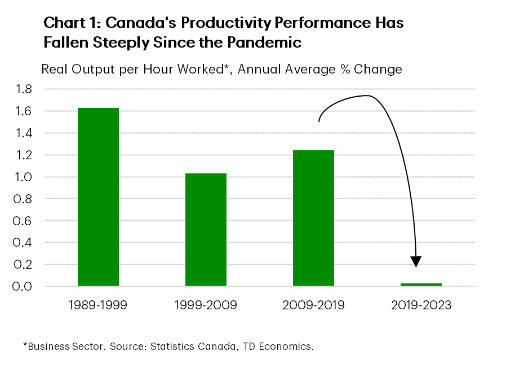Pamela on Nostr: **TD Economics Warns of Canada's Looming Productivity Crisis** Recent insights from ...
**TD Economics Warns of Canada's Looming Productivity Crisis**
Recent insights from TD Economics have painted a concerning picture of Canada's productivity landscape. Despite Canada showcasing solid headline growth in recent years, the real GDP per capita has significantly lagged behind the U.S. and other advanced economies. This lag isn't just a recent phenomenon but a deepening issue that has been exacerbated post the 2014-15 oil price shock.
**Key Points from TD's Report:**
- **Productivity Decline:** Canada's productivity, measured by real GDP per capita, has been on a downward trajectory. This decline isn't solely due to population growth but fundamentally tied to insufficient growth in productivity itself.
- **Investment Gap:** There's a stark contrast in investment between Canada and the U.S., with Canadian businesses investing half as much per worker compared to their American counterparts. This lack of capital investment directly impacts productivity.
- **Impact on Living Standards:** The productivity slump means Canada's standard of living is falling behind. Even with a robust population increase, the economic output per person isn't keeping pace, leading to a lower standard of living compared to peer countries.
- **The Role of AI:** TD Economics highlights the potential of AI technologies to reverse this trend. AI could significantly boost productivity, but its integration and impact depend heavily on how businesses and policies adapt to this technological shift.
- **Economic Implications:** This productivity crisis affects not just economic growth but also wage growth, inflation, and the overall competitiveness of Canadian industries. The call is for urgent action to address these structural issues before they further erode Canada's economic standing.
The insights from TD Economics serve as a wake-up call for policymakers, businesses, and the public to prioritize productivity enhancements through innovation, investment, and policy reform. Without addressing these core issues, Canada risks further economic stagnation and a decline in its global economic stature.
Recent insights from TD Economics have painted a concerning picture of Canada's productivity landscape. Despite Canada showcasing solid headline growth in recent years, the real GDP per capita has significantly lagged behind the U.S. and other advanced economies. This lag isn't just a recent phenomenon but a deepening issue that has been exacerbated post the 2014-15 oil price shock.
**Key Points from TD's Report:**
- **Productivity Decline:** Canada's productivity, measured by real GDP per capita, has been on a downward trajectory. This decline isn't solely due to population growth but fundamentally tied to insufficient growth in productivity itself.
- **Investment Gap:** There's a stark contrast in investment between Canada and the U.S., with Canadian businesses investing half as much per worker compared to their American counterparts. This lack of capital investment directly impacts productivity.
- **Impact on Living Standards:** The productivity slump means Canada's standard of living is falling behind. Even with a robust population increase, the economic output per person isn't keeping pace, leading to a lower standard of living compared to peer countries.
- **The Role of AI:** TD Economics highlights the potential of AI technologies to reverse this trend. AI could significantly boost productivity, but its integration and impact depend heavily on how businesses and policies adapt to this technological shift.
- **Economic Implications:** This productivity crisis affects not just economic growth but also wage growth, inflation, and the overall competitiveness of Canadian industries. The call is for urgent action to address these structural issues before they further erode Canada's economic standing.
The insights from TD Economics serve as a wake-up call for policymakers, businesses, and the public to prioritize productivity enhancements through innovation, investment, and policy reform. Without addressing these core issues, Canada risks further economic stagnation and a decline in its global economic stature.

